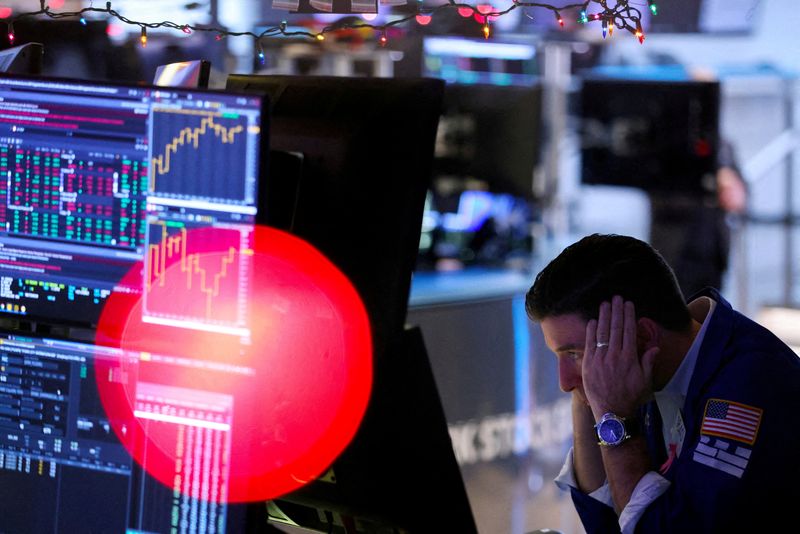
1. U.S. stock markets to close for Juneteenth holiday
U.S. stock markets are set to remain shuttered for the Juneteenth holiday on Wednesday.
On Tuesday, the benchmark S&P 500 and tech-heavy Nasdaq Composite both registered fresh record high closes, boosted by a surge in Nvidia shares that pushed the market capitalization of the artificial intelligence chipmaker above software group Microsoft to become the world’s most valuable company (more below).
Also aiding sentiment was softer-than-anticipated U.S. retail sales data for May, which pointed to a slackening momentum in consumer spending. Traders subsequently bolstered bets that the Federal Reserve will roll out two interest rate cuts this year despite the central bank recently signaling it only expects one.
2. Nvidia becomes world’s most valuable company
Nvidia’s stock price rose more than 3% to $135.58 in the prior session, pushing its market cap to $3.34 trillion and above Microsoft’s valuation of $3.31 trillion.
The California-based company, which designs processors that are seen as critical components of powerful AI models like OpenAI’s ChatGPT, added a little over $110 billion to its market cap — roughly the equivalent of the entire value of Lockheed Martin (NYSE:LMT).
Once known as a manufacturer of chips optimized for the gaming community worth around $300 billion, Nvidia has evolved over the last two years into one of the figureheads of soaring enthusiasm around the capabilities of AI. Chief Executive Jensen Huang has said Nvidia is at the heart of a new “industrial revolution” that could fundamentally alter the global economy.
Its massive share increase — including about a 170% skyrocketing so far this year — has lifted broader stock markets. A third of the 14% jump in the S&P 500 in 2024 is solely due to Nvidia’s rise.
3. Kugler signals rate cut in 2024
Inflation in the U.S. remains too high, but if economic conditions continue to move in the “right direction” it will be appropriate to slash interest rates, according to Federal Reserve Governor Adriana Kugler.
In a prepared statement on Wednesday, Kugler said that several recent signs — including fewer markups, inflation expectations, and anecdotal evidence from businesses — suggest that price increases are not being as frequently passed on to consumers. These trends, she added, indicate that “on balance, price-setting behavior is likely to continue to move closer to consistency” with the rate-setting Federal Open Market Committee’s stated 2% target.
But she noted that she believes interest rates — currently at a more than two-decade high of 5.25% to 5.50% — are at a “sufficiently restrictive” level to ease economic activity and cool inflation.
Kugler’s comments were her first since Fed officials, persuaded by stronger-than-anticipated inflation readings in the opening months of 2024, released updated rate projections last week which showed they do not expect to roll out more than one rate cut this year. In March, they had previously called for as many as three.
Elsewhere on Tuesday, New York Fed President John Williams predicted rates will come down gradually, while Richmond Fed President Thomas Barkin said he wanted to see further evidence of abating inflation before backing a rate cut.
4. Golden Goose postpones IPO
Italian high-end sportswear brand Golden Goose has postponed its planned initial public offering in Milan, citing a “significant deterioration” in market conditions following European elections earlier this month and an upcoming snap election in France.
The group, which is owned by British private equity firm Permira, added that these trends had impacted the luxury sector in particular.
Golden Goose, known for its sneakers worn by celebrities like Taylor Swift, was due to price its IPO this week. It is aiming to raise about 600 million euros at a 1.86 billion euro valuation. The company noted that it would look into reviving the IPO “in due course.”
5. Crude prices inch down
Crude prices edged lower Wednesday, as an unexpected build in U.S. crude inventories raised concerns over demand.
By 03:44 ET, the U.S. crude futures (WTI) traded 0.2% lower at $80.52 per barrel, while the Brent contract dropped 0.2% to $85.13 a barrel.
U.S. crude stocks rose by 2.26 million barrels in the week ended June 14, according data from the American Petroleum Institute, released late Tuesday. Analysts had expected a 2.2 million barrel draw in crude stocks.
Official U.S. inventories from the Energy Information Administration are due on Thursday, a day later than usual due to the U.S. holiday.
To read the full article, Click Here
